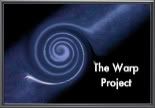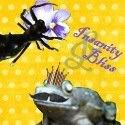TOS: Episode 29: Operation: Annihilate!
We open this episode to discover a straight-line of mass insanity from planet to planet through space. The Enterprise is in pursuit of a ship flying right into the heart of the local sun. The crew had been hoping to arrive at the next planet inline for insanity before the condition took hold, but instead discover that the flier of the sun-chasing ship (a) came from Deneva, the planet next in line for going crazy, and (b) headed into the sun on purpose. Surely such a situation bodes poorly for the Denevian condition. Even better, we then hear that Kirk's brother, Sam, and his family are stationed on Deneva too.
Episode Summary
Jim's own family, who we have not heard of prior to this episode, are stationed on what is considered to be one of the most beautiful planet's in its galaxy. His brother is there as a research biologist. Jim and his away team beam to the surface only to discover that the inhabitants of the planet have confined themselves indoors. Shortly after arrival, a small group of men approach screaming for the away team to stay away, saying "we don't want to hurt you," and yet the men approach threatening with clubs. The team stuns the men, and McCoy scans them discovering an unusually high level of activity in their nervous systems, as if they are being violently stimulating even while unconscious. Immediately following we hear a woman screaming, and discover Jim's brother, Sam, dead, and his son and wife unconscious, though still alive. Jim beams aboard with McCoy, and Sam's unconscious family, leaving Spock in charge of the away team. On board the Enterprise the family turns out to be in extreme pain, and the crew is left unaware of the cause. Jim turns to Sam's wife to ask for information. She reports that "things" traveled to the planet eight months before causing the problems. She begins screaming again.
"When she answers questions, any questions, it's as if she's fighting to get the answers out. As if something is causing her pain." McCoy explains. Sam's wife continues to answer questions even in the midst of her struggle, until all her life signs stop, and she dies, there in Kirk's arms.
From Sam's wife, we hear that something is forcing people to serve as their arms and legs, to build ships and transport them through space. All we know is that it is some kind of creature, willing to kill to get its way.
The crew pursues a strange buzzing sound, only to discover a slimey, farting, flying, ray-like animal. They fire. The creature is left unharmed, and Spock explains, that the thing is life unlike anything they have known before. Shortly after, Spock is landed on by one of the creatures, and though Kirk removes it from him, it leaves a puncture wound on his back, causing Spock to behave strangely. During surgical exploration McCoy discovers that a stinger has been left in Spock's back from which tentacles have grow all over Spock's nervous system. Spock wakes, in a violent state from severe pain, fighting against what the creature would make him do.
Eventually, we discover that the strange ray-like creatures are single cells of a vastly connected brain creature operating without physical connection to each other. The fact that the rays are interconnected in some fashion is meant to explain why the are unaffected by outside attack. How to destroy them remains a mystery.
Episode Tidbits
Spock is the sweetest character of all time. This episode only reinforces the sincere loving admiration I cannot help but have for him. Though all evidence shows Spock to be in almost unbearable pain, being pressured by the creature inside his body to take over the Enterprise, he still asserts "I have my own will" and so proves his own conviction to be greater than that of the pain being caused him.
It occurs to me that my ever increasing love of Spock reveals my overly Kantian ethical commitments. Kant describes a pure form of morality as a kind of perfectionist ideal in which we overcome our animalistic inclinations, or subjective interests, for the sake of following the moral law itself. Kant is often criticized as offering too high a standard, and so treating the moral life as an ultimately unhuman one. We could take Spock to represent such a high ideal too. I think this is a misunderstanding of Kant's own project, however. Not to mention Spock's ultimate character. Though Kant's earliest works on moral philosophy do read in terms of this perfectionist standard, he also described the point of these texts as only the early portions of his overall moral project--the later parts of which were to ground the demands of moral law in the life of real human beings through a kind of moral anthropology. Kant in other words, did not intend that we should imagine human life to be so devoid of reality, simply that if we could abstract to what might allow us to understand a moral demand at all, we would recognize a kind of pure moral law that we cannot help but feel beholden too. Spock would seem to illustrate the kind of demand Kant points to here. There is a sense in which Spock's dedication to logic would often seem both inexplicable, and yet make sense at the same time. That is, it would surely be "easier", in one sense, for Spock to do otherwise, but he cannot help but feel the demands logic-making places on him. In this way, Spock, I think, serves as a beautiful example of someone facing the high demands of Kantian perfectionism, while also integrating that perfectionism into a developing, thoroughly lived life.
The worry I would have in my loving obsession with Spock is that it could show itself as too strong an attachment to the perfectionist side of Kant's moral philosophy. My love of Spock though comes not only from his incredible ability to assert his "own will", as he put it, in the face of genuinely human/animalistic struggles such as pain, temptation, and even pleasure, but also because of the way he develops and refines himself over the course of his life. It is older Spock, in all his handsome glory, that calls forth my greatest love. Towards the end of his life Spock shows not only the incredible self-control he's always had, but also a great sensitivity to others feelings and needs, the ability to express that sensitivity through a sophisticated compassion, and a great appreciation for the value of life. Spock, then, ultimately represents a shift from simple Kantian perfectionism, to a thorough intergration of that high level demand with the long term, lived reality of Aristotelian virtue ethics. To put Aristotelian virtue ethics simply: the standard we face to be good is not in perfection, but instead in careful, moment by moment consideration of the best choice we can make, the best thing we can do, based on who we are, within whatever situation we may face. Best in such a context would have to be understood as housed, absolutely, in what we are able to do, what we are able to think through and decide. In this way, virtue must be understood as in relation to who we actually are, not in relation to some external standard we couldn't possibly meet. Spock shows how we may improve our perfectionist drives by striving for long term, and continual care of who we are, and how we behave in relation to others, and in relation to the circumstances we find ourselves within.
Perhaps, more interestingly, Episode 29 showcases an excellent fight scene between Kirk and Spock. As the final episode of Season 1, we get to see Kirk and Spock fight each other for the first time. The excitement of this fight comes from us seeing most clearly too in this episode how strong the feeling and commitment they share for each other really turns out to be. With Spock almost incapacitated, it is clear how dearly Kirk loves him. The fight, and its accompanying friend-love, we see in this episode is surely the very thing that encourages what comes at the beginning of Season 2, in Episode 30--the fight to the death that Spock and Kirk engage in on planet Vulcan.
"Operation: Annihilate!" also showcases a greater complexity of our main characters. Spock shows a great strength of character, as well as the facing of his own limitations more readily than ever before. McCoy shows his own pain in the face of radical failure, when he believes himself to have damaged his fellow officer. And Kirk struggles over the loss of his family, and the potential loss of one of his best friends. After a half-season absence, Nurse Chapel, long affectionate towards Spock, returns too to suffer along side the man she can't help but love, as he deals with his own ultimate pain and limitation.
As a happy side note: I'm convinced that Spock was Gene Roddenberry's favorite character too. As many of us know, Nurse Chapel is played by Majel Barrett, the wife of Roddenberry himself. Her character is written with a great softness towards Spock, in a way no other character shows to him. She would love him, if he would let her. I believe that in knowing the beauty of the love Roddenberry's own wife could offer someone, he made sure she was the one put in the position to offer that love to his own favorite character--Spock--because he knew no one besides Spock could be more deserving. The one deserving of such tenderness, for Roddenberry, is only the one that can be so incredibly good as Spock.
The Entire Star Trek Universe at High Speed
Subscribe to:
Post Comments (Atom)








1 comment:
I love the contrast b/w your summary and the summary offered by Sabrina, age 10.
Post a Comment